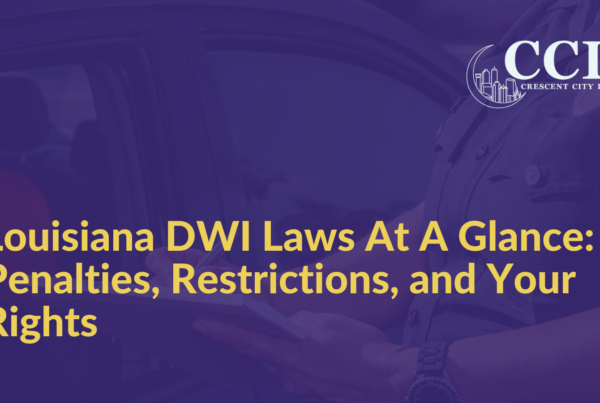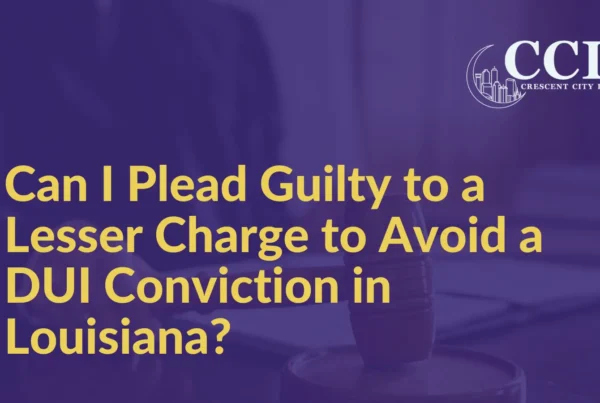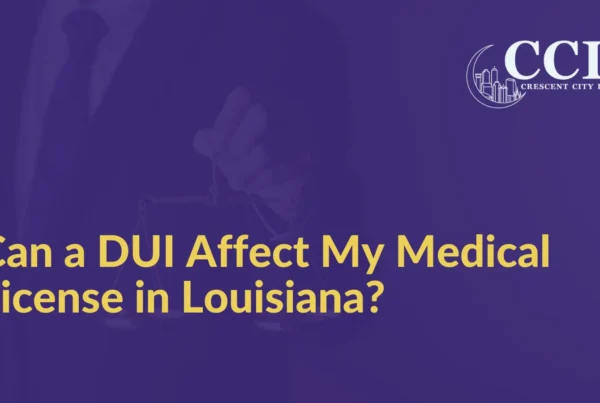Driving while intoxicated (DWI) is a serious offense that can have significant legal consequences, including fines, license suspension, and even jail time. In Louisiana, DWI laws are strict, but the severity of the penalties depends on various factors, including the number of prior offenses.
At Crescent City Law, our team understands how challenging and overwhelming navigating DWI laws in Louisiana can be. It is essential to have an experienced DWI attorney, such as John Radziewicz, to ensure a robust defense and the most favorable results possible. If you didn’t already know, he’s been arrested for DWI. Twice. He’s been in your shoes.
One common question among individuals facing DWI charges is whether DWI is considered a felony in Louisiana. In this blog, we’ll discuss the details to provide clarity on this important issue.
Is DWI a Felony in Louisiana?
In Louisiana, when the police pull you over and subsequently arrest you for DUI, a first or second DWI offense is typically classified as a misdemeanor.
However, a third offense, fourth offense, and any subsequent DWI offenses are considered felonies.
A DWI becomes a felony when the offender has at least two previous DWI convictions within a 10-year period. Prosecutors may enhance a new DWI charge by including prior DWI convictions, especially if there is not a 10-year “cleansing” period between the completion of probation for a previous DWI and the date of the new DWI arrest.
Third-Offense DWI
A third DWI offense within a ten-year period is classified as a felony in Louisiana. The penalties for a third-offense DWI are significantly more severe than those for a first or second offense and may include:
- Mandatory minimum jail time ranging from at least one to a maximum of five years.
- The first year must be served in prison, but the remaining sentence can be probation.
- Higher fines of $2,000
- Lengthy license suspension
- 240 hours of community service
- Installation of an ignition interlock device
- Completion of a substance abuse program
Several additional factors can increase the severity of DWI penalties in Louisiana, including:
- High Blood Alcohol Concentration (BAC): Driving with a BAC of 0.15% or higher can result in enhanced penalties, including longer license suspension and mandatory participation in a substance abuse program.
- Presence of Minors: Driving under the influence with a minor (under 12 years old) in the vehicle can result in enhanced penalties, including higher fines and longer jail sentences.
- Aggravating Circumstances: Aggravating factors such as causing a serious injury or death while driving intoxicated can lead to felony charges and harsher penalties.
Fourth and Subsequent Offense DWI
A fourth or subsequent DWI offense in Louisiana is considered a felony, regardless of the time frame between offenses. The penalties for multiple DWI convictions can be severe and may include:
- Lengthy prison sentences of a minimum of 10 years to a maximum of 30 years
- The first two years must be served in prison, but the remaining sentence can be probation.
- Significant fines of $5,000
- Up to 5 years probation after release from prison
- 320 hours of community service
- Permanent revocation of driving privileges
- Mandatory participation in a substance abuse treatment program
- Designation as a habitual offender
Consequences and Remediation for a DWI Conviction in Louisiana
The consequences of a DWI conviction in Louisiana extend beyond legal penalties and can impact various aspects of an individual’s life, including:
- Employment: A DWI conviction can result in job loss or difficulty securing employment, particularly in professions that require driving or involve working with vulnerable populations.
- Losing your Driver’s License: A 4th Offense DWI conviction in Louisiana will likely result in the loss of your driver’s license for 4 years and make it difficult for you to maintain employment.
- Personal Relationships: The stigma associated with a DWI conviction can strain personal relationships and lead to social isolation.
- Financial Stability: DWI fines, legal fees, and increased insurance premiums can place a significant financial burden on individuals convicted of DWI.
- Seek Legal Representation: Consult with an experienced DWI attorney who can provide personalized legal guidance and representation throughout the legal process.
- Explore Defense Strategies: Your attorney can evaluate the circumstances of your case and develop effective defense strategies to challenge the charges against you.
- Address Underlying Issues: If alcohol dependency or substance abuse is a contributing factor to your DWI offense, seek help from a qualified treatment program to address these issues and prevent future offenses.
How Can Legal Representation Help?
While DWI is typically considered a misdemeanor offense in Louisiana, multiple offenses or aggravating factors can elevate the charge to a felony. The consequences of a DWI conviction can be severe and far-reaching, impacting various aspects of an individual’s life.
If you are facing DWI charges, it’s crucial to seek legal representation and take proactive steps to address the situation. By understanding the DWI laws in Louisiana and exploring available resources for support and remediation, individuals can navigate the legal process with greater confidence and work towards achieving a positive outcome.
Contact Us at Crescent City Law Today!
At Crescent City Law, our seasoned DWI attorneys are well-equipped to navigate the complexities of Louisiana’s DWI laws. A DWI conviction could significantly affect your personal and professional life. With our proven experience in representing clients, we enhance your prospects of reducing potential impacts. We encourage you to secure the legal assistance you need.
To begin discussing your case and get your questions answered, contact us at 504-264-9492 and schedule your initial consultation today.






